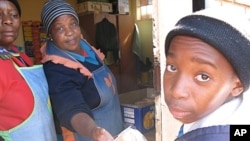While U.S. first lady Michelle Obama has left South Africa after an emotional visit, many South African volunteers already have been practicing what she preached - ensuring healthy nutrition for at-risk students.
It is the beginning of a school break at Reasoma high school in Soweto, but before they head home, students jostle in line as volunteers distribute loaves of bread, milk cartons, oranges and bags of cereal called Morvite.
Rosina Maredi is one of the volunteers. "They take it at home to get to eat it at home because they have got nothing at home," she said.
One of the students biting through an orange is 13-year-old Tshepo Motsoko.
"Some of us we cannot afford to get money from our parents. Some of us we cannot afford to pay school fees. Some of us we cannot afford to get food like milk, Morvite and bread, so I think it is a good project for us who do not have enough money to pay for things like this," said Motsoko.
Helping high school students
Grants for teenagers like Tschepo usually cover school fees, but not food. There are government feeding programs for primary school children, but not yet for high schools.
But on lunch breaks here at the Reasoma high school, about 120 at-risk students usually get peanut butter or jam sandwiches and sometimes soup, with fruit and milk. The bread is bought from a local baker.
School staff is also working on a vegetable garden which should reap cabbage, spinach and beet root to add to the lunches in a few month's time.
Lunchbox Fund
The initiative which extends to several other schools is spearheaded by a U.S.-based non-profit organization called the Lunchbox Fund. It relies on private and corporate donations mostly from the United States and partnerships with more affluent schools.
Project manager Gillian Wilkinson says the program encourages students to go to school since they know they will get food, keeps them healthy and also helps them concentrate. She says there is also an important psychological dimension.
"I think it also gives the children a sense of worthwhileness and a spirit that somebody, somewhere, cares enough that they do not have to live in this bleak dispirited empty world that they have been offered so far," she said.
Many of the students targeted in the program live without their parents. Some take care of their siblings. Some are AIDS orphans. Some previously turned to prostitution to survive. Others used to buy marijuana instead of food to numb their hunger since a matchbox full of drugs can be purchased for less than one dollar.
Improving the program
Teacher Lydia Rakhivhani is cleaning up a school desk. She says the program can still be better organized. The distribution of food can be a little hectic, she says.
"Most of the kids who come and get the food they are the boys. Ladies they are very shy," she said. "In my class, I have this one kid, she is a lady, so she asked me to get food for her, so I went there and took some food and put it in my class during lunch break. She came and fetched it from me."
Involving local businesses
Reasoma graduate 18-year-old Lesedi Lion also felt more could be done. Several years ago, she wrote a letter to a grocery store in Soweto asking for help.
Now, every week, she comes by the store to pick up cartons of milk and bags of cereal to add to the program.
"I am from an unfortunate family so I just thought of that and then I put it in my shoes to help out more children in my school because mostly people do not take into consideration that most children in high schools are needy. They concentrate on primary schools. So I wanted to uplift our high school and encourage people to start sponsoring high schools," she said.
The grocery store operator, Joao Jardim, was impressed.
"It is a good thing to help. What inspired me? Her age and the courage she has and I think she is doing quite well to keep the young kids and I think that is why I tried with her and it is working," said Jardim.
Lion graduated last year, but is currently unemployed. She does not have enough money to go to university. She says it is still important to help others, even if she faces her own difficulties.
Several of the volunteers said Michelle Obama's visit had inspired them, and that her recent speeches in South Africa had given them more strength to continue trying to help more and more challenged students, one lunch at a time.













